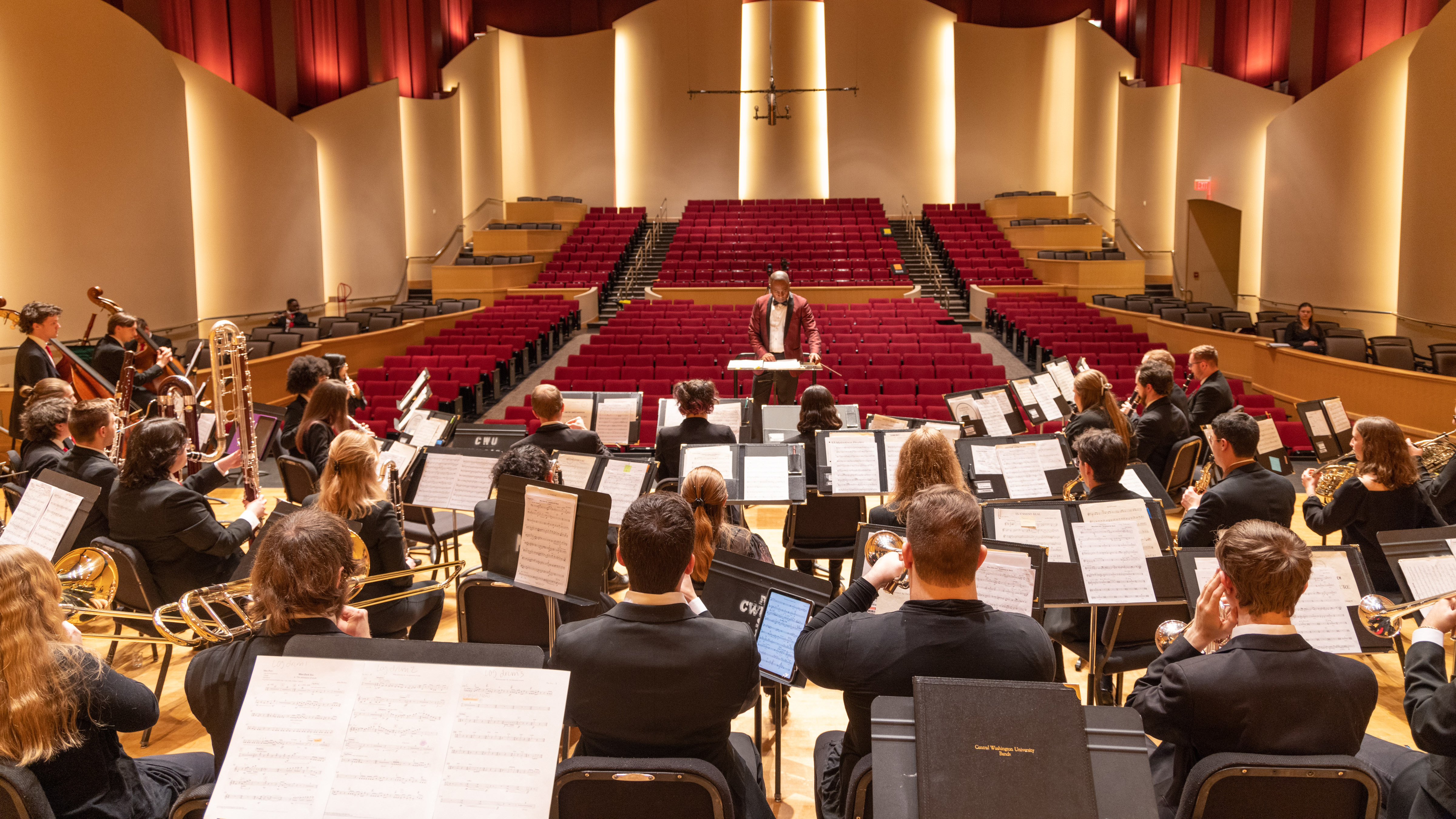
Music
Graduate Music Student Handbook
The Graduate Student Handbook has been prepared as a reference tool for students pursuing graduate degree programs in the CWU Department of Music. Information is included about the department, its degree programs, major concentrations, cognate areas of study, degree deadlines, student responsibilities and relevant music office procedures. Further information, which applies to all music students, can be found in the Undergraduate Student Handbook on our Student Resources page. Areas covered there include: user/course fees, use of department resources, recital scheduling, policies, procedures and fees etc.
Graduate Info
-
Graduate Program
All candidates must complete at least 45 credits as delineated in an approved course of study filed with the Office of Graduate Studies and Research. The major fields are:
- Composition
- Conducting
- Performance
- Pedagogy
- Music Education
At least one-third of the total credit requirements must be in the major field, including MUS 700 as required by the specialization; one-third in other music courses (including three credits of MUS 521 [Methods of Musical Research], six credits of music history, six credits of music theory, and three ensemble credits); and one-third may be elective courses in supportive areas from any discipline. At least 25 credits applied toward the degree must be at the 500 level or above. No more than 20 credits applied toward the degree may be at the 400 (senior undergraduate) level. No 300 level credits may be applied toward the degree. Students are expected to plan their program with a graduate advisor and committee.
-
Graduate Colloquium
Accreditation by the National Association of Schools of Music (NASM) requires that music departments create “a traditional and/or virtual community of students and faculty to permit the formal and informal sharing of experience, ideas, and knowledge.” (NASM Handbook X.B.4) The Graduate Colloquium is the means by which this community is created and fostered through opportunities for students to present and share their work, have formal and informal discussions with faculty and other guests, and share announcements and information of broader interest.
Colloquia are organized by the Graduate Coordinator and are held once quarterly. Colloquium does not require registration, but satisfactory Colloquium attendance (100%) is a graduation requirement for all enrolled graduate students. Attendance is monitored by the Graduate Coordinator, who will report attendance records when students apply for graduation. If extreme circumstances prevent full attendance, students may appeal to the Graduate Committee for consideration of alternate fulfillment of the attendance requirement.
-
General Requirements for All Graduate Music Degrees
- Courses in Major Field, including MUS 700, Thesis - Credits: 15-21
- Other Studies in Music including below - Credits: 18
- MUS 521 - Methods of Musical Research Credits: (3)
- Six credits of music history Credits: (6)
- Six credits of music theory Credits: (6) (Composition majors may substitute a non-theory course in this category)
- Three credits in ensemble courses Credits: (3) (Course substitution for ensemble requirements for summer MM Education degree program)
- Department-Approved Electives Credits: 6-12
Total Credits: 45
-
Graduate Cognate in Music
Similar to an undergraduate minor, a graduate cognate in music lends more coherence to the cluster of elective courses students take beyond those required for the degree and offers more meaningful recognition for this cluster of courses.
Students must complete a total of 13 credits to complete a cognate: minimum of 12 credits of courses approved by the cognate advisor in consultation with the major advisor, plus 1 credit of MUS 600, Graduate Cognate Project in the quarter the required culminating work is presented, above the 45 credits required for the master’s degree (totaling a minimum of 58 for the degree with major and cognate).- Cognate Subject Areas
- Composition
- Conducting
- Jazz Pedagogy
- Music Education
- Music History
- Music Theory
- Performance
- Performance-Pedagogy
-
Graduate Committee and Option Approval Form
The Graduate Committee and Option Approval Form has two functions: to indicate the members of the student’s Graduate Committee (with the chair of the committee duly noted) and selection of the type of culminating project that will be completed.
All graduate students must select a Graduate Committee to help guide their studies, also acting as mentors. The chair of this committee is usually the program advisor in the student’s major field of study. The student should seek advice from this advisor in choosing other members of the committee, based on areas of expertise related to the student's project. Usually committee members must be approved Graduate Faculty. A non-approved faculty member may receive permission to serve as a committee member upon application, but normally are not permitted to act as committee chairs. Students may learn which music faculty are members of the Graduate Faculty by inquiring in the Music Department Office. The committee should be formed as early as possible in the student's graduate career, usually during the first term on campus.
The other part of this form is for selecting the type of thesis or non-thesis project that will be appropriate as a culminating experience for the degree. Once a topic has been chosen the student then secures agreement of the student’s Graduate Committee with their signatures on the form. Once this form has been submitted to and approved by the Office of Graduate Studies, changes of committee members can be made only via resubmission of the form.
-
Thesis Requirements
An important consideration for all music Masters students is that most final projects are not in the form of a thesis. This is contrary to most of the information found on the forms from the Office of Graduate Studies which is due to the fact that most other disciplines do in fact complete final projects in thesis form. However, in music most theses are considered “projects”. Consultation between the candidate and his/her graduate advisor is essential at all stages of thesis/project activity. In addition, the candidate should be aware of and follow the directions given in the Music Department Thesis Guidelines (PDF). The following information presents some basic considerations regarding the several types of theses stipulated for the Master of Music degree. Copies of previous theses, projects, and covering papers are available for perusal in the Music Department Office.
Below are Thesis and Project expectations for the CWU Music Department.
Research Thesis
In preparing a research thesis, the candidate should demonstrate the following qualities:
- Knowledge of the available literature on the subject
- Ability to use musical analysis as a research tool when appropriate
- Ability to present the information gathered in the research process in a well-organized and convincing form.
- Ability to use the English language in a correct, clear and direct manner.
- Knowledge of and ability to use research tools specific to music
Pedagogy Thesis
As a thesis, the student will present either:
- A demonstration project with covering paper, and one-half of a public recital. OR
- A demonstration project, and one-half of a public recital with covering paper based on the works presented on the recital OR
- A research paper and one-half a public recital. OR
- A self contained research of pedagogical project.
The demonstration project will be formulated in consultation with the student's advisor and should consist of a practical application of expertise gained in the courses of the student's work in the major field of study. The covering paper may address any pedagogical problem in general, or it may be related to specific problems encountered in the preparation of the recital. The subject and scope of the paper will be decided upon in consultation with the student's advisor.
Composition Thesis
The thesis (MUS 700, 6 credits) will be an original composition of a level appropriate as a final project, with a covering paper. Normally this paper will be based on the thesis composition.
Conducting Thesis
As a thesis (MUS 700, 6 credits) the student will conduct a public performance and submit a covering paper. Normally this paper will be based on the works conducted.
Performance Thesis
As a thesis (MUS 700, 6 credits) the student will present a full public recital and submit a covering paper. Normally this paper will be based on the works presented in the recital.
Music Education Thesis
As a culminating experience (MUS 700), the student will present either:
- MUS 700 - Master’s Thesis, Project Study, and/or Examination Credits: (1-6)
- A research thesis (6 credits MUS 700).
- A demonstration, analytical or creative project and a covering paper based on the project (6 credits MUS 700).
- A written preliminary examination, program portfolio, and oral examination (3 credits MUS 700).
Submission of Final Project Papers
Completed thesis and project papers must be submitted to the graduate coordinator in the format outlined in the Thesis Guidlines document above. The music department retains these papers, not the GSR office, and therefore students should submit these materials only to the Music Graduate Coordinator.
-
Final Examinations
All students must pass a comprehensive final examination, oral, or written and oral, based on their coursework and the thesis, project, or portfolio. Before the Final Examination can be scheduled, students must have completed and submitted the written portion of the thesis, project, or portfolio.
According to University policy, an application for the final examination, approved by the student’s graduate committee, must be filed in the Graduate Office at least three weeks in advance of the examination. This application has several specific parts to it, so early acquisition and completion of this form is strongly recommended. Consult the Graduate Office for any and all appropriate deadline dates.
-
Health, Safety, and Emergency Policies
University policies for Ethics, Health and Safety, and Compliance can be found by clicking the links below. Policies and procedures for emergency preparedness, along with important information about CWU's Emergency Notification System, can be found in the Campus Police portion of the University web site. (the following links will open in a new window or a new tab)
CWU News

$4 million federal grant aimed at helping with school psychologist shortage
February 25, 2026 by Marketing and Communications

CWU Disability Services aims to provide equitable access to education
February 23, 2026 by Rune Torgersen